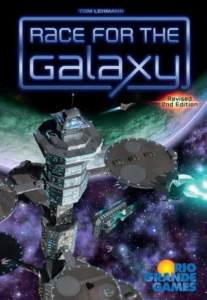Race for the Galaxy by Tom Lehmann [Library of Things]

view/request
Build a galactic civilization! This incredibly clever and evocative card game (for 2-4 players) has you exploring, settling worlds, developing industries, and producing and trading goods. It’s a competitive game, but interactions with your fellow players are limited. There is a lot of skill involved and there are opportunities to affect your fellow players. Your resources are cards you draw from a facedown pile, so there is no competition there—but each turn you choose a phase to play, and all players get to benefit from that phase. The trick to coming out on top? Choosing phases that benefit you more than they benefit the other players! Each phase—explore, develop, settle, consume, and produce—has its uses, and the player that chose the phase gets a special bonus. It’s a fun mechanic, and one that can be quite exciting as the game nears its end—on the last turn, will you get a chance to both settle and develop? You can only choose one!
The game cards are rich with information: the cost to play them, the points they are worth, and symbols and text indicating what bonuses they give during each phase of play. The system of symbols is elegant and concise but takes some getting used to—the game comes with a large reference card for each player that you will find useful when learning the game, in time you will realize you don’t need it any longer, but it is invaluable when learning the game. The game cards also have wonderful art which I continue to enjoy game after game.
One of the best things about this game is its simple mechanisms and setup. There are only two components: cards, and victory point tokens. Victory point tokens represent extra points at game end. Cards are multipurpose and represent everything else in the game. Cards are your currency—you discard cards from hand to pay for things. Cards are your worlds and developments—when you settle or develop you pay the cost and place the card in front of you, adding it to your civilization. And cards are the goods produced by industry and traded in commerce—a card placed under a world is a good which you can trade (discard to draw more cards into your hand) or consume (discard to draw more cards or gain victory point tokens).
It’s also a pretty quick game once you are familiar with it. My girlfriend and I play often, and we almost always play multiple games in a sitting. Why not? The game is out, quick to setup, quick to play, and it’s lots of fun!
